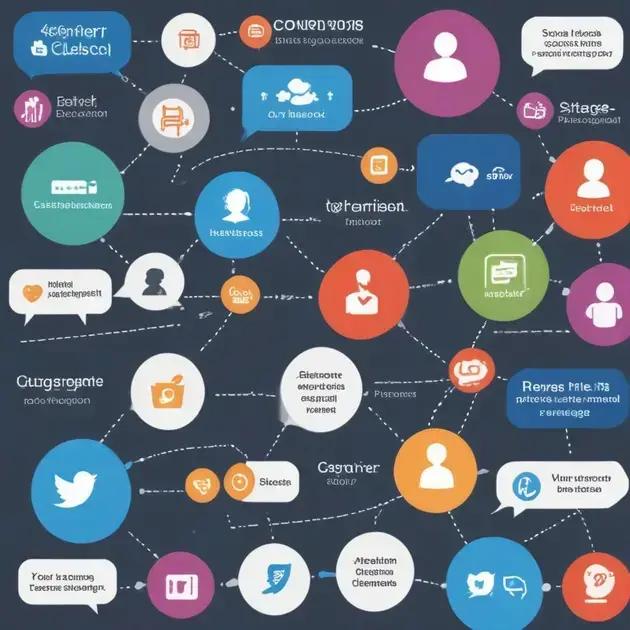Effective customer management is crucial for business success, involving strategies like personalized service, utilizing CRM tools, and measuring performance through key metrics. By enhancing customer engagement and satisfaction, businesses can foster loyalty and drive growth.
Customer management is crucial for businesses aiming to build lasting relationships and enhance satisfaction. By mastering customer management, companies can significantly improve their operations while positioning themselves competitively in the market. In this article, we’ll delve into the essentials of customer management, its significance, various tools available, effective strategies, and metrics to measure success.
Understanding Customer Management
Understanding Customer Management is one of the foundational steps for any business looking to thrive. At its core, customer management refers to strategies and practices that businesses use to maintain relationships with their customers while optimizing their interactions for better satisfaction. A robust customer management system helps in managing customer information, tracking interactions, and improving service delivery.
The Role of Customer Management
Effective customer management plays a vital role in enhancing customer loyalty. By understanding their needs and preferences, businesses can tailor their offerings and improve customer experiences. This leads to increased satisfaction and subsequently, higher retention rates.
Key Components
Some key components of customer management include customer relationship management (CRM) tools, communication strategies, and customer feedback systems. CRM systems are essential for storing and organizing customer data, which is crucial for personalized marketing and service efforts.
Benefits of Effective Customer Management
When businesses prioritize customer management, they benefit from improved customer insights, better targeted marketing, and dynamic customer engagement. These elements allow for not only immediate satisfaction but also long-term relationships that contribute to overall business success.
Challenges in Customer Management
Despite its benefits, challenges such as data management, understanding customer needs, and integrating technology can arise. Overcoming these challenges requires careful planning, ongoing training, and using innovative tools that enhance the customer experience.
Importance of Customer Relationship Management

Importance of Customer Relationship Management (CRM) cannot be overstated in today’s competitive business environment. A well-structured CRM system is essential for businesses to efficiently manage interactions with their customers, helping to foster deeper relationships and enhance customer satisfaction.
Building Strong Customer Relationships
CRM allows businesses to collect and analyze customer data, which helps in understanding preferences and behaviors. This knowledge enables companies to build personalized experiences that resonate with their customers, resulting in stronger relationships.
Boosting Customer Retention
One of the primary goals of CRM is to boost customer retention. By effectively managing customer interactions and addressing their concerns promptly, businesses can create loyal customers who are more likely to make repeat purchases. Retaining an existing customer is typically less expensive than acquiring a new one.
Improving Communication
Effective CRM systems enhance communication through various channels. Whether it’s through emails, social media, or in-person meetings, a good CRM system organizes all customer interactions. This ensures that your teams are well-informed, facilitating smoother and more effective communication.
Gaining Valuable Insights
With a robust CRM, businesses can gain valuable insights into market trends and customer preferences. This data empowers companies to make informed decisions, adjust their marketing strategies, and develop products that better meet customer needs.
Enhancing Efficiency
CRM systems streamline processes by automating tasks like follow-ups and data entry, allowing employees to focus on more strategic objectives. This increase in efficiency can lead to improved productivity and better customer service.
Tools for Effective Customer Management
Tools for Effective Customer Management are essential for businesses aiming to streamline their processes and enhance their customer engagement. Various tools available in the market help organizations manage customer relationships more effectively, ensuring personalized service and improved customer satisfaction.
Customer Relationship Management (CRM) Software
One of the most significant tools for customer management is CRM software. These systems, such as Salesforce, HubSpot, and Zoho, allow businesses to store customer information, track interactions, and manage sales pipelines. With these tools, companies can easily analyze customer data and tailor their marketing strategies.
Email Marketing Platforms
Email marketing platforms like Mailchimp and Constant Contact enable businesses to reach their customers directly through personalized communications. By segmenting their audience, organizations can send targeted messages that resonate more with their customers’ interests.
Help Desk and Customer Support Tools
Having a robust help desk tool, such as Zendesk or Freshdesk, can significantly improve customer management. These platforms help track customer inquiries, manage support tickets, and ensure timely responses, thus fostering better customer satisfaction.
Social Media Management Tools
Tools like Hootsuite or Buffer allow businesses to manage their social media presence effectively. They enable companies to schedule posts, track engagement, and respond to customer inquiries across various social media platforms in one place.
Survey and Feedback Tools
To understand customer needs better, utilizing survey and feedback tools such as SurveyMonkey or Typeform is crucial. These tools allow businesses to gather customer insights and opinions, helping improve products and services based on real feedback.
Strategies for Improving Customer Engagement

Strategies for Improving Customer Engagement are critical for building lasting relationships with your customers. Engaged customers are not only more likely to make repeat purchases but also to advocate for your brand. Here are several effective strategies to enhance customer engagement.
Personalization
Personalizing interactions can significantly boost engagement. Use customer data to tailor communications, recommendations, and offers. When customers feel valued and understood, they are more likely to connect with your brand.
Provide Exceptional Customer Service
Excellent customer service is a cornerstone of engagement. Make sure your team is trained to resolve issues promptly and effectively. Providing support through multiple channels, like phone, email, and live chat, ensures customers can reach you easily.
Utilize Social Media
Social media platforms are valuable tools for engaging with customers. Regularly post content that resonates with your audience, seek feedback, and address inquiries or comments. Use polls and contests to encourage interaction and make customers feel involved.
Content Marketing
Creating valuable content, such as blog posts, videos, or infographics, can keep customers informed and engaged. Focus on topics that interest your audience and showcase how your products or services can meet their needs.
Gather and Act on Customer Feedback
Encourage customers to provide feedback through surveys or reviews. Use this information to improve your offerings and show customers that their opinions matter. When customers see changes based on their feedback, they feel more connected to your brand.
Measuring Customer Management Success
Measuring Customer Management Success is essential for understanding the effectiveness of your strategies and improving overall performance. By tracking specific metrics, businesses can gain insights into customer interactions and satisfaction levels, allowing for informed decision-making.
Key Performance Indicators (KPIs)
Identifying and tracking key performance indicators such as customer lifetime value (CLV), customer satisfaction scores (CSAT), and net promoter scores (NPS) is crucial. These metrics provide a clear picture of how well your customer management strategies are working.
Customer Feedback
Collecting regular feedback from customers through surveys and interviews can help gauge satisfaction and identify areas for improvement. Analyzing this feedback allows businesses to make necessary adjustments to enhance customer experiences.
Retention Rates
Monitoring customer retention rates is another essential metric. High retention suggests effective customer management practices, while low retention may indicate issues that need to be addressed.
Sales and Revenue Growth
Tracking sales and revenue growth pre- and post-implementation of customer management strategies can highlight their impact. An increase in these areas typically reflects successful customer engagement and management.
Regular Assessment and Adjustments
Finally, regularly assessing your customer management practices and making adjustments based on the data collected is vital. This ensures that your strategies remain effective and aligned with customer needs and market changes.
In Summary: Strengthening Customer Management
Effective customer management is essential for any business that wants to grow and succeed. By implementing strategies like personalization, exceptional customer service, and utilizing the right tools, companies can engage their customers more effectively.
Measuring success through key performance indicators helps businesses understand their strengths and weaknesses. Listening to customer feedback and making adjustments is crucial for improvement.
Ultimately, when businesses focus on improving customer management, they build strong relationships, foster loyalty, and drive growth. Embracing these practices can lead to lasting success in a competitive market.
FAQ – Frequently Asked Questions about Customer Management
What is customer management?
Customer management involves strategies and practices that companies use to manage their relationships with customers, enhancing satisfaction and loyalty.
How can I improve customer engagement?
Improving customer engagement can be achieved through personalization, exceptional customer service, and actively communicating via social media and email.
What tools can I use for customer management?
Tools such as CRM software, email marketing platforms, and customer survey tools are effective for managing customer relationships and engagement.
Why is measuring customer management success important?
Measuring success helps businesses understand their effectiveness, identify areas for improvement, and make data-driven decisions.
How can I collect customer feedback?
Customer feedback can be collected using surveys, reviews, and direct conversations, allowing businesses to gauge satisfaction and improve services.
What metrics should I track for customer management?
Key metrics include customer satisfaction scores, retention rates, and customer lifetime value, which offer insights into customer relationships and business performance.




